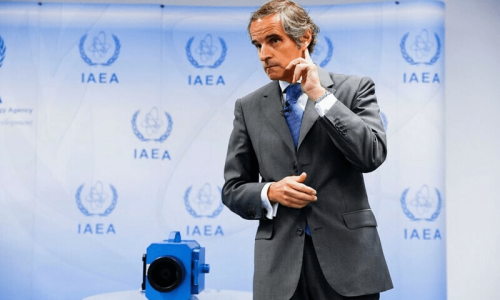
DAMASCUS: Syrian President Bashar al-Assad signed a decree to lift almost five decades of draconian emergency rule on Thursday, as a protest movement that has rocked his regime called further demonstrations.
Assad, who has been in power since he replaced his father 11 years ago, issued the order to scrap the state of emergency along with separate decrees to abolish the state security court and to allow citizens to protest peacefully.
The announcements were flashed in succession on Syrian state television.
The moves are aimed at placating more than a month of unprecedented protests across the country, ruled by one of the Middle East’s most autocratic regimes since the Baath Party seized power 48 years ago.
Amnesty International says about 220 people have been killed by security forces and plainclothes police in a brutal crackdown on the protests, which first erupted in mid-March.
Syria's emergency law restricts many civil liberties, including public gatherings and freedom of movement, and allows the “arrest of anyone suspected of posing a threat to security.”
Assad's regime has offered a series of concessions to the pro-democracy movement since the protests broke out in Damascus on March 15, but the demonstrators have been undeterred, calling for even greater freedoms.
More rallies are being planned for Friday, when the biggest demonstrations have been staged across the country each week after traditional Muslim prayers.
A page on the social networking website Facebook has called for “Good Friday” protests.
“Good Friday, April 22, 2011, one heart, one hand, one goal,” said the Facebook announcement on a banner depicting a cross atop a church between two minarets with crescents.
The call appeared on the Syrian Revolution 2011 page of Facebook, a motor of the protests in which demonstrators inspired by uprisings elsewhere in the Arab world are seeking greater freedoms.
Amnesty International, which this week cautioned that moves to lift emergency rule and abolish the security court “ring hollow,” said the crackdown cost 26 lives in recent days.
On Tuesday alone, eight people died when security forces opened fire on a protest sit-in at a square in the central industrial city of Homs, activists said.
The cabinet had on Tuesday approved a bill to rescind the emergency rule, as well as agreed to abolish the state security court while also approving a bill to regulate demonstrations.
The state security court exists outside the ordinary judicial system and usually prosecutes people considered to challenge the authority of the government, and its verdicts cannot be appealed.
Human rights groups both inside and outside Syria have repeatedly urged the authorities to scrap the feared court, described in a 2009 report by Human Rights Watch as a “kangaroo court.” President Assad finally signed the decrees on Thursday, in line with a pledge to do so this week.
The announcements on state television said Assad was ending the emergency law imposed when the ruling Baath Party seized power in 1963 as well as the state security courts.
A third decree said citizens would be granted “the right to peacefully demonstrate” and noted that this is one of the “basic human rights guaranteed by the Syrian constitution.”
Earlier on Thursday, he appointed a new governor in Homs after dismissing his predecessor on April 7 following protest-related violence, said the official SANA news agency.
“President Assad issued a decree naming Imed Mustafa Abdelal governor of Homs” in place of the sacked Mohammed Iyad Ghazal, the report said.
The ongoing violence has drawn condemnation from international human rights groups and western governments.
Amnesty this week called on Assad to “back up his pledge to introduce reforms with immediate, concrete action to end the continuing wave of killings of protesters by his security forces.”
The Paris-based International Federation for Human Rights and its branch in Syria, the Damascus Centre for Human Rights Studies, said the move to lift emergency rule “falls short of significant human rights reforms.”










































Dear visitor, the comments section is undergoing an overhaul and will return soon.